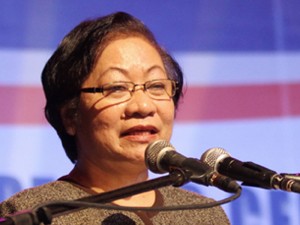KYOTO, Japan—Labor Secretary Rosalinda Baldoz on Wednesday defended the government’s policy on outsourcing at the International Labor Organization regional meeting being held here after an ILO delegate questioned the government’s handling of the labor dispute at Philippine Airlines (PAL).
Baldoz declined, however, to discuss the details of the labor case between PAL and its ground crew union—the PAL Employees Association (Palea)—but emphasized that the government was only making sure that both the rights of management and of labor were respected.
“I would rather that I respond by not discussing the details of the Palea case because this is now pending in our courts and it would be premature and sub judice,” Baldoz said during a panel discussion on workers’ rights and social dialogue.
An ILO delegate had asked her about the labor case, noting that the protesting workers “have been staying in a tent” for more than a month.
PAL laid off 2,600 members of its ground crew in September and outsourced their jobs but Palea questioned their dismissal before the Court of Appeals.
Baldoz said the Constitution recognized both the rights of labor and the prerogatives of management and that the government would step in when abuses happen.
“In our Constitution, there is a body of rights on the workers’ side and on the employers’ side. The right to collective bargaining, right to strike, peaceful concerted activities and security of tenure (for labor) and business’ right to manage and expand their enterprise and get a reasonable return of investment, as long as this is done fair and equitably,” Baldoz said.
“That’s what we look at whenever an issue of outsourcing, which is highly emotional and politicized, comes up,” she added.
Baldoz said that while Philippine law allowed for outsourcing and subcontracting, there “are certain limitations.”
“Outsourcing done by fly-by-night contractors is very much prohibited. Clearly, we now require them to be substantially capitalized. This is the first time this is being done and this a product of tripartite discussions,” she said.
Baldoz said that discussions between government, business and labor had come to the conclusion that “there is legitimate subcontracting.”
“What came out was the recognition of labor groups and management that there is legitimate subcontracting which should be recognized but that this should not be used to circumvent labor laws,” she said.
“Of course, there was also a recognition that some business activities cannot be outsourced. And that (outsourcing) is not a unilateral exercise of management. If there’s a union, there should be a collective negotiation,” she added.
